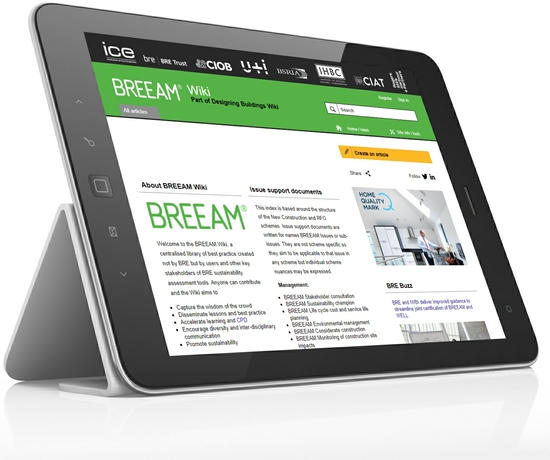A breakthrough in sharing best practice with the new BREEAM Wiki
We are now in a world where we see an increasing number of open-source solutions, where skilled professionals give freely and voluntarily towards resources available to all. Popular examples include Linux operating system and, of course, Wikipedia itself. What motivates busy, skilled professionals to give up their free time to help out? Open source contributors cite many benefits, including gaining experience, deepening understanding, promoting the open-source culture and giving back to the community. The new BREEAM Wiki (www.breeam.com/wiki) is such an outlet for sustainable construction and the April 2018 launch saw a collection of over 150 articles already created - and growing.
Contents |
[edit] Sharing best practice and lessons learnt
Lessons learnt that are not passed on often result in repeated mistakes. This happens within teams but also across an industry. There is a lot of ‘reinventing the wheel’. But what if there were a simple mechanism for capturing lessons and best practice? Your project could benefit from the lessons of hundreds of projects, not just your own.
[edit]
Of course, if disseminating lessons were that simple, it would already be widespread, so what stops it from happening? Time and conflicting priorities, probably urgent deadlines and immediate concerns can get in the way of thinking about capturing experience. But what if sharing a lesson was as a simple as making a note in a book? You can register to use the BREEAM Wiki in two minutes and the multiple-author articles mean you can make a single line ‘tip’ to an existing article just as quickly.
[edit] Sharing what is most useful
Wiki articles can sometimes veer towards the aspirational, but evidence compiled by Designing Buildings Wiki shows that the most read articles are those that address the immediate concerns on a project. The BREEAM Wiki, with multiple author articles, encourages content that covers the most immediately useful topics for sustainable construction projects. These include our Issue Support Documents which contain guidance and best practice relating directly to individual sustainability topics.
[edit] Accessible platform with great visibility on search engines
BREEAM Wiki is hosted on the established Designing Buildings Wiki which now has over 6.5 million unique users per year. It also has great search engine visibility and, because that is the way most people reach any online content, this means BREEAM Wiki articles will appear high in search engine results. Try typing a BREEAM Wiki article title into a search engine and see for yourself.
[edit] Crowdsourcing and quality
A functioning wiki captures the integrated wisdom of the crowd; the more people exposed to the content the more representative and accurate it can become. When people use a wiki they know it is exactly that, which encourages a critical eye rather than blind acceptance. If you see anything incorrect it can be immediately corrected. In fact, a wiki can help bring any myths or misunderstandings to the surface where they can be corrected, instead of being left unchecked.
[edit] 5 easy ways to engage today
- Visit www.breeam.com/wiki and register (2 mins)
- Share the Wiki (or any article) via email or social media easily via the share button
- Add a new line of content to a Multiple Author Article
- Author a whole article yourself and link it to your profile and website
- Register for the next live online knowledge sharing workshop
--Paul Thistlethwaite 10:48, 23 Apr 2018 (BST)
Featured articles and news
Call for greater recognition of professional standards
Chartered bodies representing more than 1.5 million individuals have written to the UK Government.
Cutting carbon, cost and risk in estate management
Lessons from Cardiff Met’s “Halve the Half” initiative.
Inspiring the next generation to fulfil an electrified future
Technical Manager at ECA on the importance of engagement between industry and education.
Repairing historic stone and slate roofs
The need for a code of practice and technical advice note.
Environmental compliance; a checklist for 2026
Legislative changes, policy shifts, phased rollouts, and compliance updates to be aware of.
UKCW London to tackle sector’s most pressing issues
AI and skills development, ecology and the environment, policy and planning and more.
Managing building safety risks
Across an existing residential portfolio; a client's perspective.
ECA support for Gate Safe’s Safe School Gates Campaign.
Core construction skills explained
Preparing for a career in construction.
Retrofitting for resilience with the Leicester Resilience Hub
Community-serving facilities, enhanced as support and essential services for climate-related disruptions.
Some of the articles relating to water, here to browse. Any missing?
Recognisable Gothic characters, designed to dramatically spout water away from buildings.
A case study and a warning to would-be developers
Creating four dwellings... after half a century of doing this job, why, oh why, is it so difficult?
Reform of the fire engineering profession
Fire Engineers Advisory Panel: Authoritative Statement, reactions and next steps.
Restoration and renewal of the Palace of Westminster
A complex project of cultural significance from full decant to EMI, opportunities and a potential a way forward.
Apprenticeships and the responsibility we share
Perspectives from the CIOB President as National Apprentice Week comes to a close.
























